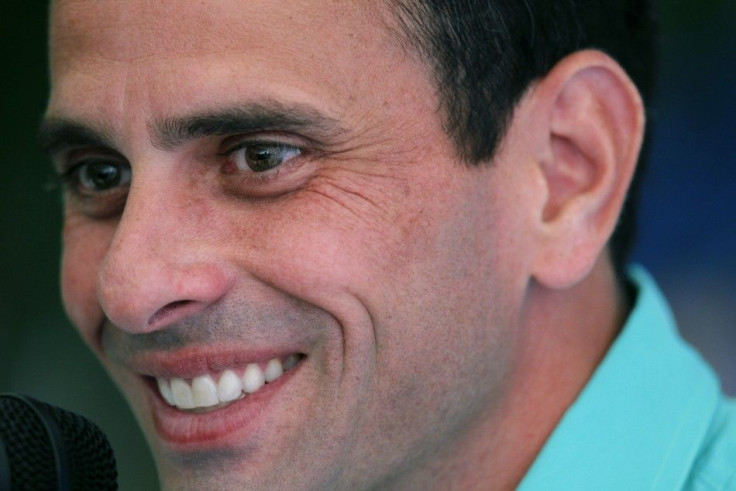Venezuela: Hugo Chavez’ Anti-Semitic Election Campaign
ANALYSIS

In Venezuela, the upcoming presidential election has an interesting twist. Socialist Hugo Chavez, who has ruled the oil-rich South American nation for 13 years, will be opposed by Henrique Capriles Radonski.
Chavez and some of his supporters and allies have waged a vicious anti-Semitic campaign against Capriles.
The catch, however, is that Capriles is a practicing Catholic -- in an overwhelmingly Catholic country.
Capriles, 39, who was born in Caracas, is the grandson of Jewish immigrants from Russia and Poland who fled Europe during World War II. His maternal great-grandparents died in the Treblinka extermination camp.
Regardless of how Capriles identifies himself, his candidacy has unleashed a wave of anti-Jewish sentiments in Venezuela, a country with a long history of anti-Semitism.
While serving as governor of Miranda, Venezuela’s second-largest state, he endured an onslaught of anti-Jewish vitriol from Chavez supporters.
Nevertheless, the handsome young Capriles is now believed to be the most popular politician in Venezuela, according to polls, and offers a formidable opponent to Chavez.
The outspoken socialist is burdened by the perception that, despite the country's vast oil wealth, Venezuela is sinking under an epidemic of violent crime, soaring inflation and declining services, among other ills.
Chavez may also have a personal grudge against Capriles.
In 2004, Capriles spent four months in jail on charges related to an attempted coup against Chavez two years earlier. In a speech to lawmakers, referring directly to Capriles, Chavez once blustered: You are not going to be able to disguise yourself, even if you look for advisers, masks. Dress yourself up however you dress yourself up. Pig's tail, pig's ears, pig's nose: It's a pig.
Moreover, when Capriles ran for governor in 2008, the Chavez-controlled media described Capriles as a member of the “Jewish-Zionist bourgeoisie” and bizarrely, even “genetically fascist.” Capriles has even been labeled a “Nazi” by some Chavez cohorts.
“They came here and they called me ‘Nazi,’ when my grandmother was in the Warsaw Ghetto,” Capriles told The Forward newspaper.
“My great-grandparents were killed in a concentration camp. My grandmother’s mother and father were killed by the Nazis in Treblinka.”
Some publications have even photo-shopped a Star of David onto Capriles’ face.
Venezuela has one of Latin America's oldest Jewish communities, dating back to the early 19th century. Jews even participated in the liberation movement of Venezuela's national hero, Simon Bolivar.
Although he espouses fervent Catholicism, Capriles has good relations with Venezuela's small Jewish community, which accounts for 12,000 to 16,000 of the nation's 30 million citizens. The number of Jews in the country has reportedly diminished under Chavez amid skyrocketing violent crime, particularly in the capital city of Caracas, where Jews are concentrated.
Meanwhile, Chavez has a long and unsavory record against the country's Jews.
Chavez in a Christmas 2005 speech directly attacked the Jews when he ominously said, “Some minorities, the descendants of the people who crucified Christ, [who] seized the riches of the world. ... A minority has taken possession all of the wealth of the world.
Chavez has also repeatedly vilified Israel while cultivating close relations with anti-Semites like Iranian President Mahmoud Ahmadinejad.
Chavez’ anti-Semitic rhetoric has spread concern across the Jewish Diaspora.
Michael Salberg, director of international affairs at the Anti-Defamation League, told the Jerusalem Post, “You have in Chavez a political leader, a head of a country, who engages in the use of political anti-Semitism. Someone who engages in scapegoating and accusations against the Jewish community, particularly around issues in the Israeli-Palestinian conflict.”
Similarly, Abraham Foxman, director of ADL, said in a statement, Blatant and persistent anti-Semitism is used by President Chavez and his government apparatus as a divisive political tool. What we are seeing at the outset of Venezuela's presidential elections is an attempt to cast the opposition candidate as a 'traitorous Jew' who is unworthy of the presidency.”
Shimon Samuels, director of international relations at the Simon Wiesenthal Center, wrote in a letter to Chavez, We urge President Chavez to put an end to this campaign that will surely become more threatening as the election date approaches. Chavez carries the ultimate responsibility for his own media outlets and can personally stop their hate-mongering.
With nine months before the election, Jews fear that as Chavez becomes more desperate to hold onto power that anti-Jewish rants against Capriles will increase. A Jewish Venezuelan told reporters, “The campaign hasn’t even begun yet, but we’re sure there will be [anti-Semitic] attacks.”
Rabbi Pynchas Brener, a prominent Jewish leader and Chavez opponent, said The atmosphere of intimidation is terrifying. We do not know when this pressure will start to ease up.”
© Copyright IBTimes 2025. All rights reserved.





















